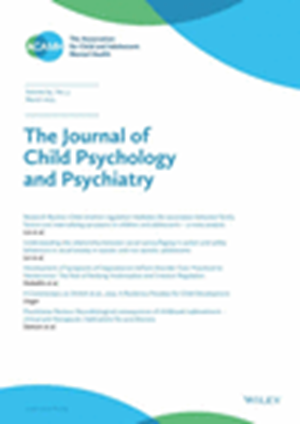Mother–infant stress contagion? Effects of an acute maternal stressor on maternal caregiving behavior and infant cortisol and crying
IF 6.5
1区 医学
Q1 PSYCHIATRY
引用次数: 0
Abstract
BackgroundPostpartum maternal distress has been associated with adverse infant outcomes. A potential pathway of how maternal distress affects infant outcomes could be alterations in maternal caregiving behavior. However, the associations between maternal distress, caregiving behavior, and infant outcomes have never been tested in a controlled experiment. This preregistered study utilized an experimental design to investigate the effects of an acute maternal stressor on infant cortisol and crying and the possible mediating role of maternal caregiving behavior.MethodsMother‐infant dyads (母婴压力传染?急性母亲应激源对母亲照料行为和婴儿皮质醇和哭闹的影响
产后母亲的痛苦与婴儿的不良结局有关。母亲痛苦如何影响婴儿结局的一个潜在途径可能是母亲照顾行为的改变。然而,母亲痛苦、照料行为和婴儿结局之间的关联从未在对照实验中进行过测试。本研究采用预先注册的实验设计来调查急性母亲应激源对婴儿皮质醇和哭泣的影响,以及母亲照顾行为可能的中介作用。方法91对母婴在产后8周进行实验室访问,母亲与婴儿分开进行特里尔社会压力测试(TSST)或对照任务。这项任务之后立即进行了母婴互动,以评估母亲的照顾行为和婴儿的皮质醇和哭泣。结果结构方程模型发现,应激源/控制条件对母亲照料行为和婴儿对母亲应激反应的影响不存在差异。第二项研究发现,高质量的母亲照顾行为与低水平的婴儿哭闹和低水平的皮质醇有关,但与团聚时的皮质醇无关。结论我们的研究结果不支持在本实验环境下母婴压力传染的发生,但确实表明母亲照顾行为与婴儿行为和皮质醇反应之间存在联系。鉴于产妇心理健康问题的高发率及其可能与后代发育的负相关,需要进一步的(实验)研究来了解产妇产后痛苦如何影响幼儿。
本文章由计算机程序翻译,如有差异,请以英文原文为准。
求助全文
约1分钟内获得全文
求助全文
来源期刊
CiteScore
13.80
自引率
5.30%
发文量
169
审稿时长
1 months
期刊介绍:
The Journal of Child Psychology and Psychiatry (JCPP) is a highly regarded international publication that focuses on the fields of child and adolescent psychology and psychiatry. It is recognized for publishing top-tier, clinically relevant research across various disciplines related to these areas. JCPP has a broad global readership and covers a diverse range of topics, including:
Epidemiology: Studies on the prevalence and distribution of mental health issues in children and adolescents.
Diagnosis: Research on the identification and classification of childhood disorders.
Treatments: Psychotherapeutic and psychopharmacological interventions for child and adolescent mental health.
Behavior and Cognition: Studies on the behavioral and cognitive aspects of childhood disorders.
Neuroscience and Neurobiology: Research on the neural and biological underpinnings of child mental health.
Genetics: Genetic factors contributing to the development of childhood disorders.
JCPP serves as a platform for integrating empirical research, clinical studies, and high-quality reviews from diverse perspectives, theoretical viewpoints, and disciplines. This interdisciplinary approach is a key feature of the journal, as it fosters a comprehensive understanding of child and adolescent mental health.
The Journal of Child Psychology and Psychiatry is published 12 times a year and is affiliated with the Association for Child and Adolescent Mental Health (ACAMH), which supports the journal's mission to advance knowledge and practice in the field of child and adolescent mental health.

 求助内容:
求助内容: 应助结果提醒方式:
应助结果提醒方式:


